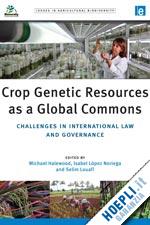1. The Global Crop Commons and Access and Benefit-Sharing Laws: Examining the Limits of Policy Support for the Collective Pooling and Management of Plant Genetic Resources Michael Halewood, Isabel López Noriega and Selim Louafi. Part 1: Setting the scene: countries’ interdependence on plant genetic resources for food and agriculture and the imperative of international cooperation. 2. Demonstrating interdependence on plant genetic resources for food and agriculture Marleni Ramirez, Rodomiro Ortiz, Suketoshi Taba, Leo Sebastian, Eduardo Peralta, David Williams, Anne Vezina, and Andreas Ebert. 3. Flows of crop germplasm into and out of China Fuyou Wang. 4. Crop and forage genetic resources: International interdependence in the face of climate change Julian Ramirez, Andy Jarvis, Sam Fujisaka, Jean Hanson and Christoph Leibing. 5. Changing Rates of Acquisition of Plant Genetic Resources by International Gene Banks: Setting the Scene to Monitor an Impact of the International Treaty Michael Halewood, Raj Sood, Ruaraidh Sackville Hamilton, Ahmed Amri, Ines Van den Houwe, Nicolas Roux, Dominique Dumet, Jean Hanson, Hari D. Upadhyaya, Alexandra Jorge and David Tay. Part 2: The history and design of the International Treaty’s multilateral system of access and benefit-sharing. 6. Brief history of the negotiations of the International Treaty on Plant Genetic Resources for Food and Agriculture Jose Esquinas Alcázar, Angela Hilmi, Isabel López Noriega. 7. The design and mechanics of the multilateral system of access and benefit sharing Daniele Manzella. 8. Protecting the interests of the multilateral system: the Third Party Beneficiary Gerald Moore. 9. Plant genetic resources "under the management and control of the contracting parties and in the public domain": how rich is the basket of the multilateral system? Carlos Correa. 10. Efforts to get the multilateral system up and running: a review of activities coordinated by the Treaty Secretariat Selim Louafi and Shakeel Bhatti. Part 3: Critical reflections. 11. Experiences of countries in the implementation of the multilateral system: incentives and challenges at the country level Isabel Lopez Noriega, Peterson Wambugu and Alejandro Mejías. 12. From negotiations to implementation: global review of achievements, bottlenecks and opportunities for the Treaty in general, and the multilateral system in particular Godfrey Mwila. 13. The multilateral system of access and benefit-sharing: could it have been constructed another way? Clive Stannard. 14. The Moving Scope of Annex 1: The List of Crops Covered under the Multilateral System Bert Visser 15. Building a Global Information System in Support of the International Treaty on Plant Genetic Resources for Food and Agriculture Caroline Ker, Myriam Sanou and Selim Louafi. 16. Collective action challenges in the implementation of the multilateral system of the International Treaty. What roles for the CGIAR Centres? Selim Louafi. 17. International and regional cooperation in the implementation of the International Treaty on Plant Genetic Resources for Food and Agriculture Gerald Moore. 18. The evolving global system of conservation and use of plant genetic resources for food and agriculture: what is it, and where does the Treaty fit it? Toby Hodgkin, Nicole Demers and Emile Frison. 19. Institutionalizing global genetic resource commons for food and agriculture Tom Dedeurwaerdere. Index.











